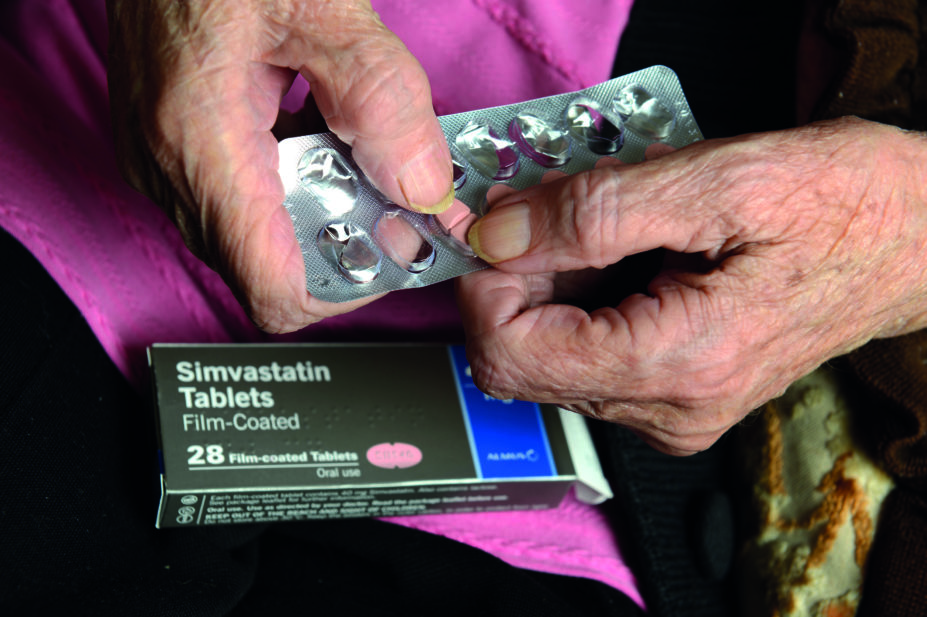
Jack Sullivan / Alamy Stock Photo
Health professionals need to do more to address concerns about side effects in patients prescribed statins after a stroke, research suggests.
A study of an online forum for stroke survivors found some patients disregarding the advice of their GP and even stopping secondary prevention medications altogether.
Taking a more proactive approach in making patients aware that other treatment options are available and may suit them better, as well as active follow-up in patients who are having problems with side effects, would go some way to solving the problem, the team led by Queen Mary University of London (QMUL) concluded.
The analysis, published in Family Practice
[1]
, was based on the archives of TalkStroke, a forum hosted by the Stroke Association.
A search of posts made between 2004 and 2011 identified 50 participants who discussed the advice they had received from their GP on prevention medications in 43 discussion threads.
Side effects of statins in particular were found to cause anxiety and resentment among some patients, who felt their concerns were not being addressed by their GP.
Posts showed that, in some cases, the advice of the GP was ignored and patients stopped taking the drugs after one or two attempts to adjust treatment.
However, the advice and peer support that was available on the forum was accurate.
The researchers said that secondary prevention medication can reduce the risk of further stroke by up to 75% but that adherence can drop off over time.
Lead researcher and NIHR academic clinical lecturer Dr Anna De Simoni, from QMUL, said: “I am a GP and these findings have changed my own practice when I start patients on statins and when they consult about side effects.
“Given the variety of cholesterol-lowering treatments and possible approaches to manage statin-intolerant patients, I was surprised to see that patients seemingly lost hope after only one or two contacts with their GPs, unaware that a better regimen may have been available or that their GP would have been able to carry out another change in medication.”
Dr De Simoni said she now advises patients that multiple treatment options are available and it may take a bit of trial and error to find the right one for them.
“It is also important to proactively invite them to seek help if side effects are experienced and don’t improve.”
Helen Williams, consultant pharmacist for cardiovascular disease, South London, clinical associate for cardiovascular disease, Southwark CCG and clinical network lead for cardiovascular disease, Lambeth CCG, said that pharmacists “are ideally placed to have these discussions and support patient to adhere and persist with therapy” and “should be proactive in asking patients about their statin therapy and particularly any concerns they have, any side effects they are experiencing”.
“Advice offered could be as simple as reminding them of the benefits, or may require changes to the dose or timing of the dose, to recommending a switch to a different agent,” she said. “For example, atorvastatin and simvastatin are lipid-soluble drugs with one set of side effects, while pravastatin and rosuvastatin are water soluble and often are not associated with the troublesome side effects such as muscle pain or insomnia.”
Alexis Wieroniey, deputy director of policy and influencing at the Stroke Association, said it is estimated that statins save 7,000 lives in the UK every year. “It is vital that those who could benefit from statins are identified and treated.
“It is also important that doctors explain the side effects and benefits of statins and other prevention medications, and support patients in making informed decisions about their treatment.”
- This article was amended on 20 April 2017 to correct an error within a quote, which should have stated that pravastatin and rosuvastatin, rather than pravastatin and atorvastatin, are water soluble.
References
[1] Izuka NJ, Alexander MAW, Balasooriya-Smeekns C et al. How do stroke survivors and their carers use practitioners’ advice on secondary prevention medications? Qualitative study of an online forum. Family Practice 2017;cmx023. doi: 10.1093/fampra/cmx023


